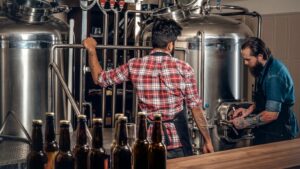 In the ever-evolving landscape of brewing, technology plays a pivotal role in shaping the industry’s future. From innovative brewing equipment to automated processes, advancements in brewing technology have revolutionized the way beer is crafted and enjoyed. Breweries around the world are embracing cutting-edge solutions to enhance efficiency, quality, and sustainability in their production methods. As brewers strive to meet the demands of a rapidly growing market, staying abreast of the latest brewing technologies is crucial for success. Whether it’s precision temperature control systems or state-of-the-art fermentation monitoring tools, the integration of technology in brewing has opened up a world of possibilities for brewers to experiment and push the boundaries of traditional brewing practices.
In the ever-evolving landscape of brewing, technology plays a pivotal role in shaping the industry’s future. From innovative brewing equipment to automated processes, advancements in brewing technology have revolutionized the way beer is crafted and enjoyed. Breweries around the world are embracing cutting-edge solutions to enhance efficiency, quality, and sustainability in their production methods. As brewers strive to meet the demands of a rapidly growing market, staying abreast of the latest brewing technologies is crucial for success. Whether it’s precision temperature control systems or state-of-the-art fermentation monitoring tools, the integration of technology in brewing has opened up a world of possibilities for brewers to experiment and push the boundaries of traditional brewing practices.
Brewing Technology
Brewing technology has revolutionized the brewing industry, enhancing efficiency, quality, and sustainability. Breweries must leverage the latest technological advancements to meet market demands effectively. Innovations like precision temperature control and fermentation monitoring tools enable brewers to refine traditional methods, pushing the boundaries of brewing practices. This section delves deeper into how technology intersects with the artistic and scientific aspects of brewing.
Modern Brewing Equipment
Modern brewing equipment has revolutionized the industry, providing breweries with innovative solutions to enhance their production processes and meet consumer demands efficiently.
Quality Control Technologies
Quality control technologies play a crucial role in ensuring the consistency and excellence of brewed beverages. From real-time monitoring systems to advanced sensory analysis tools, breweries can maintain high-quality standards and meet consumer expectations effectively.
Sustainable Practices in Brewing
 Continuing the discussion on brewing technology, sustainable practices play a pivotal role in the brewing industry’s evolution. Breweries are increasingly focusing on sustainability to reduce environmental impact and ensure long-term viability. Implementing eco-friendly initiatives not only benefits the planet but also enhances operational efficiency and consumer trust. By integrating sustainable practices into their brewing operations, breweries can not only reduce costs and increase efficiency but also demonstrate their commitment to environmental stewardship and meet the growing consumer demand for eco-conscious products.
Continuing the discussion on brewing technology, sustainable practices play a pivotal role in the brewing industry’s evolution. Breweries are increasingly focusing on sustainability to reduce environmental impact and ensure long-term viability. Implementing eco-friendly initiatives not only benefits the planet but also enhances operational efficiency and consumer trust. By integrating sustainable practices into their brewing operations, breweries can not only reduce costs and increase efficiency but also demonstrate their commitment to environmental stewardship and meet the growing consumer demand for eco-conscious products.
- Energy Efficiency: Embracing energy-efficient brewing equipment and processes is essential for reducing carbon footprint. Breweries are adopting technologies like heat exchangers and LED lighting to minimize energy consumption significantly.
- Water Conservation: With water being a precious resource in brewing, sustainable breweries are investing in water recycling systems and advanced filtration methods to minimize water wastage and maintain quality standards.
- Waste Management: Efficient waste management practices involve recycling brewing byproducts like spent grains and yeast to create animal feed or biofuels, reducing overall waste production and promoting circular economy principles.
Advancements in Fermentation Control
Modern brewing technology has revolutionized the fermentation process, introducing advanced control systems that offer brewers unprecedented precision and efficiency. Automation has streamlined brewing operations, reducing manual labor and ensuring consistency in the brewing process. It allows brewers to control various stages of production with precision, increasing efficiency and productivity. These innovations enable breweries to monitor and regulate fermentation parameters with exceptional accuracy, resulting in consistent product quality and flavor profiles.
- Automated Fermentation Monitoring: Brewing equipment now integrates sophisticated sensors and software that allow real-time monitoring of fermentation data. Brewers can remotely track crucial variables like temperature, pH levels, and dissolved oxygen, ensuring optimal fermentation conditions without manual intervention.
- Precision Temperature Control: With the advent of precise temperature control systems, brewers can create tailored fermentation profiles to achieve specific flavor characteristics. By maintaining stable temperatures throughout the fermentation process, breweries can produce a wide range of beer styles with consistent quality and taste.
The advancements in fermentation control technology empower breweries to elevate their production standards, meet consumer preferences, and drive innovation in the dynamic brewing industry. By embracing these technological breakthroughs, brewers can refine traditional brewing practices, achieve operational excellence, and deliver exceptional beers that resonate with a diverse market.

